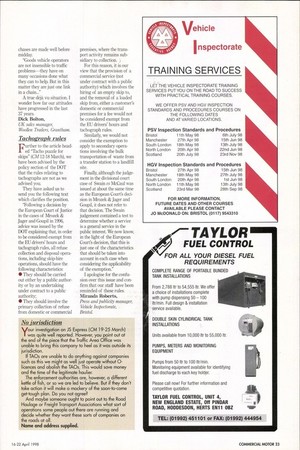Tachograph rules Further to the article headed "Tacho puzzle for
Page 25

If you've noticed an error in this article please click here to report it so we can fix it.
skips" (CM 12-18 March), we have been advised by the policy section of the DOT that the rules relating to tachographs are not as we advised you.
They have asked us to send you the following text which clarifies the position.
"Following a decision by the European Court of Justice in the cases of Mrozek & Jager and Goupil in 1996, advice was issued by the DOT explaining that, in order to be considered exempt from the EU drivers' hours and tachograph rules, all refuse collection and disposal operations, including skip-hire operations, should have the following characteristics: • They should be carried out either by a public authority or by an undertaking under contract to a public authority; • They should involve the primary collection of refuse from domestic or commercial premises, where the transport activity remains subsidiary to collection.
For this reason, it is our view that the provision of a commercial service (not under contract with a public authority) which involves the hiring of an empty skip to, and the removal of a loaded skip from, either a customer's domestic or commercial premises for a fee would not be considered exempt from the EU drivers' hours and tachograph rules.
Similarly, we would not consider the exemption to apply to secondary operations involving the bulk transportation of waste from a transfer station to a landfill site.
Finally, although the judgement in the divisional court case of Swain vs McCaul was issued at about the same time as the European Court's decision in Mrozek & Jager and Goupil, it does not refer to that decision. The Swain judgement contained a test to determine whether a service is a general service in the public interest We now know, in the light of the European Court's decision, that this is just one of the characteristics that should be taken into account in each case when considering the applicability of the exemption."
I apologise for the confusion over this issue and confirm that our staff have been reminded of these rules.
Miranda Roberts, Press and publicity manager, Vehicle Inspectorate, Bristol.




































































































